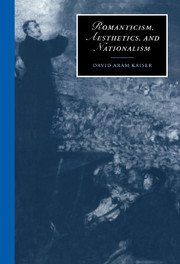Book contents
- Frontmatter
- Contents
- Acknowledgements
- List of abbreviations
- Introduction
- 1 Modernity, subjectivity, liberalism, and nationalism
- 2 The symbol and the aesthetic sphere
- 3 Schiller's aesthetic state
- 4 Symbol, state, and Clerisy: the aesthetic politics of Coleridge
- 5 The best self and the private self: Matthew Arnold on culture and the state
- 6 Aesthetic kingship and queenship: Ruskin on the state and the home
- 7 The aesthetic and political spheres in contemporary theory: Adorno and Habermas
- Notes
- Index
1 - Modernity, subjectivity, liberalism, and nationalism
Published online by Cambridge University Press: 22 September 2009
- Frontmatter
- Contents
- Acknowledgements
- List of abbreviations
- Introduction
- 1 Modernity, subjectivity, liberalism, and nationalism
- 2 The symbol and the aesthetic sphere
- 3 Schiller's aesthetic state
- 4 Symbol, state, and Clerisy: the aesthetic politics of Coleridge
- 5 The best self and the private self: Matthew Arnold on culture and the state
- 6 Aesthetic kingship and queenship: Ruskin on the state and the home
- 7 The aesthetic and political spheres in contemporary theory: Adorno and Habermas
- Notes
- Index
Summary
THE POLITICS OF ROMANTICISM
In English language criticism, the place to begin the discussion of the political context of Romanticism is with the work of Raymond Williams. His account of Coleridge in Culture and Society lays out the essential terms of discussion:
Coleridge's emphasis in his social writings is on institutions. The promptings to perfection came indeed from “the cultivated heart” – that is to say, from man's inward consciousness - but, as Burke before him,Coleridge insisted on man's need for institutions which should confirm and constitute his personal efforts. Cultivation, in fact, though an inward was never a merely individual process.
Williams' account of Coleridge presents us both with opposing terms, “institutions” versus “man's inward consciousness,” and with the means of overcoming that opposition through “cultivation,” that is, through the medium of culture. As a Marxist, Williams was critical of the conservative elements of Coleridge's political writings, but as a sociologist of knowledge, Williams agreed with Coleridge's key point that institutions and subjectivity are vitally interrelated. Indeed Williams argues in Culture and Society that an opposition between institutions and subjectivity developed throughout the nineteenth century, and that this opposition radically transformed the concept of culture.
- Type
- Chapter
- Information
- Romanticism, Aesthetics, and Nationalism , pp. 11 - 27Publisher: Cambridge University PressPrint publication year: 1999



